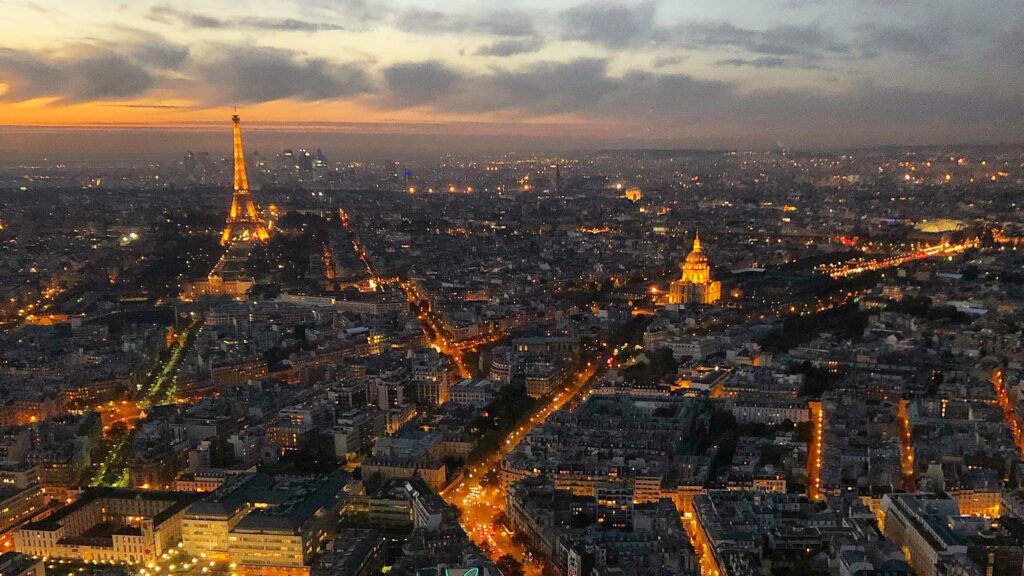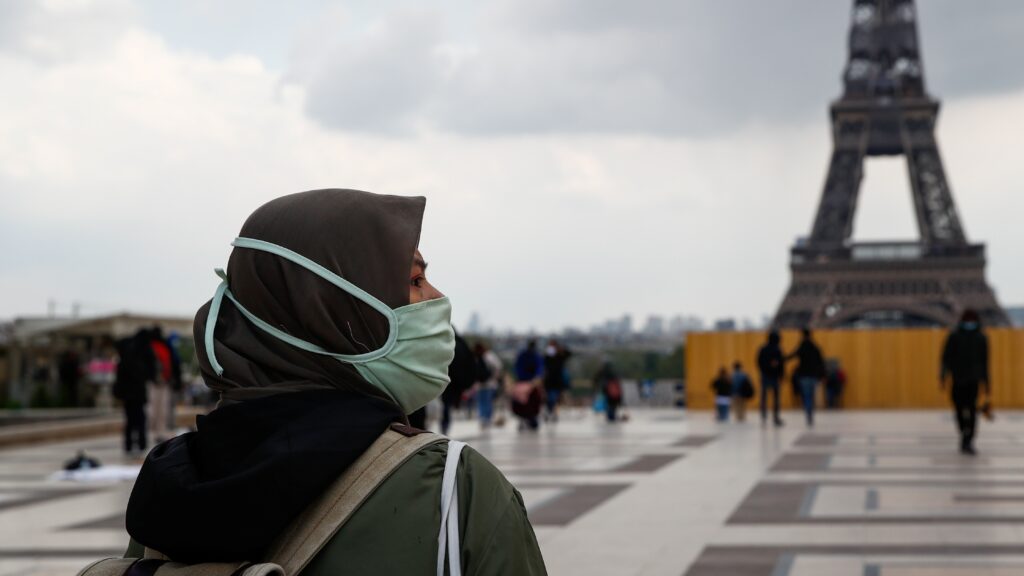“Mama, I don’t want to go to school ever again,” shared Farah, Ibtissam’s 9-year-old daughter. The coronavirus outbreak spiked in metropolitan Paris in March 2020, making France a global epicenter of the pandemic. The virus that would claim the lives of 30,000 people in France by July of that year swept everyone off the streets of Paris and the neighboring commune of Saint-Germain, where Ibtissam makes her home.
“Maybe that is a good thing,” Ibtissam thought about her daughter’s declaration. The pandemic cleared everybody off of the streets, but the plague that loomed before it marred them with a virus that seeped deep into the French soul.
A mother of three who had taken up the hijab a few years prior, the arc of Isbtissam’s converged through France’s first attempt to ban headscarves in public schools, in 1989, as well the emergence of the ardently Islamophobic Rassemblement National party 15 years later.
In 2004, the French parliament enacted law number 2004-228, which restricted the wearing of “ostentatious” religious symbols in public schools. While the law’s language was facially neutral, meaning it did not explicitly name Islam or the hijab itself, it sought to ban the wearing of headscarves, or hijabs, by Muslim girls and women.
The anti-Muslim virus spread through France’s sickened political body and discourse.
Early on, leaders along every plot of the ideological spectrum dubbed the hijab a “marker of difference” and an “affront to civilization,” sound bites that infected the political discourse and invited bigoted extremists into French corridors of power. Fringe populist political parties were now front and center, and the explicit Islamophobic rhetoric that once conflicted with French political sensibilities was now mainstream.

“Islamic fundamentalism is attacking us at home,” Marine Le Pen, head of the National Rally party and presidential hopeful, shouted. “The places of Islamic preaching will be closed and the propagators of hate will be condemned and expelled,” she continued, promising to close down mosques and deport Muslims — even longstanding citizens like Ibtissam, permanently called “immigrants” because of their religion.
The French commitment to laïcité, that long-contested concept that commits the state to secularism in public life, was no longer an idea open to debate but a bludgeon — a weapon, manipulated and maneuvered in the direction of Muslims in France.
The legal blows were inflicted within public schools “where citizens are shaped and made,” and for Muslim students, assimilated or othered.
Behind the veil of laïcité, the legal blows against Muslims kept coming. In 2011, the French parliament enacted additional legislation making it illegal for Muslim women to wear conservative coverings, including the niqab and the burqa. Nicolas Sarkozy, president of France at the time, declared, “In our country, we can’t accept women prisoners behind a screen, cut off from all social life, deprived of all identity. That’s not our idea of freedom.”
The French commitment to laïcité, that long-contested concept that commits the state to secularism in public life, was no longer an idea open to debate but a bludgeon — a weapon, manipulated and maneuvered in the direction of Muslims in France.
Driven by the belief that Muslim women were being “imprisoned” by their husbands or fathers, this belief perpetuated two entwined gender stereotypes: that Muslim women are weak and subordinate, and that Muslim men are violent and oppressive. This gendered Islamophobia reified the longstanding imperialist narrative that Muslim men were bent on war and tyranny, and that Muslim women — the immediate victims of this violence — needed saving.
Like the hijab ban enacted seven years before it, the “face covering ban” of 2011 denied women the very liberty it espoused to address: It polices Muslim women’s bodies by compelling them to dress in line with specific cultural customs. Those customs are French and secular, exposing the genuine objective of the 2011 act and the foundational law that preceded it.
Forceful assimilation and disavowal of Islamic expression, not restoration of individual liberty, was at the heart of both pieces of legislation. This French obsession with the hijab, and the female Muslim body that it adorns, has devolved into a legal psychosis hallmarked by the headscarf ban.
This contradiction sits at the heart of French Islamophobia and justifies an onslaught of state policies that emaciate the religious liberty of French Muslim women on account of an Orientalist understanding of Muslim men as irredeemably violent and repressive. Muslim men are maimed and murdered on the streets of Bondy and other banlieues throughout the republic, and are incarcerated at clips that rival those of Black men in the United States, because of this understanding.
This is how laïcité impacts French Muslims, descending on them like a plague that infects every sector of French society, and rising to the proportion of a plague in 2004 with the enactment of the hijab ban — a law that, arguably, stands as the world’s most lucid representation of structural Islamophobia, and which has caused the passage of copycat policies in Belgium and Quebec.

The hijab ban spurred the face covering ban of 2011, and then, in 2019, another law that penetrated the private confines of Ibtissam’s home. In May 2019, the French senate passed legislation banning hijab-wearing mothers, like Ibtissam, from accompanying their children during school events and trips.
In France, Islamophobia is a plague that infects the gendered arms of the law, powers the violent hands of the police, and steers the discriminatory eyes of private citizens. It is a plague that begins and ends with the classroom, that hallowed training ground where every future French citizen is made, and perpetually remade, to fit a national image that orients Islam as inimical and unassimilable — and where Muslims are pushed to the furthest margins and treated like outsiders.
In France, Islamophobia is a plague that forces a Muslim citizen like Ibtissam to keep her faith quarantined in the private sphere even when her body is out in public. It is a plague that instructs a young Muslim girl like Farah that for her, the cornerstone French principles of liberty, equality and fraternity are reduced to an impossible ultimatum: Shed your religion, and only then will these guarantees be yours.
In France, Islamophobia is a plague that long preceded the War on Terror. A plague that befell on Muslim women first, as the disproportionate victims, then spread onward. A plague spawned and spread by a “Muslim world” that sits at the continental footstep of Europe.
In France, Islamophobia is a plague that infects the gendered arms of the law, powers the violent hands of the police, and steers the discriminatory eyes of private citizens.
Where French colonialism in African and Arab nations pulled the immigrants concentrated in the banlieues into the belly of France, and the imperial conquest of Algeria that lasted from 1830 to 1962 formed a colonial bridge that Ibtissam’s parents crossed into the Paris streets that continue to see them as imperial subjects, not citizens.
French Islamophobia is a plague that preceded the coronavirus pandemic of 2020. A pandemic that covered the entire world with fear, claimed a frightening number of lives in France, and cleared the classrooms and streets of Paris of their familiar crowds.
Despite this, it was the French plague and not the coronavirus pandemic that moved Ibtissam young daughter Farah to conclude that she never wanted to return to those classrooms.
Farah would not return to school on that warm spring day, nor in the foreseeable future. But another student of French Islamophobia, masked at the mouth, would enter a classroom with the French flag, proselytizing about the dangers of the pandemic while spreading fears of that older longstanding plague.
French President Emmanuel Macron walked into the Pierre Ronsard Elementary School neatly dressed, with a black face mask decorated with a tiny French tricolor covering his mouth.
Macron staged the event, at the height of the coronavirus pandemic, to announce that the face mask he wore was to be mandated for every resident of France moving forward. Those who violated the policy would be fined 135 euros (roughly $150) and asked to return home to collect a mask before venturing out again.
“The cornerstone French principles of liberty, equality and fraternity are reduced to an impossible ultimatum: Shed your religion, and only then will these guarantees be yours.”
The pandemic exposed the fundamental hypocrisy of the French plague. While every citizen was ordered to cover their face, Muslim women who covered their face for religious purposes were legally reprimanded and fined 150 euros, 15 more than the penalty for violating the new face mask mandate.
One face covering was legally mandated, the other legally prohibited. Even if a Muslim woman like Ibtissam wore the very same piece of cloth around her face as a niqab instead of a face mask, the intention of wearing it for Islamic purposes could garner punishment.
It took a pandemic to expose the absurdity of this French policy and the capricious nature of a gendered Islamophobic regime that denied the free exercise of religion rights to Muslim women.
The hypocrisy at the core of French Islamophobia was on full display that day and thereafter. In the days to come, everybody on the streets of Paris covered their faces to protect themselves from the pandemic. The stares still came Ibtissam’s way, and the young daughter holding Ibtissam’s right hand, growing up in the dark times of overlapping pandemic and plague, would begin to understand what those stares meant.
But masks can only protect you from so much. Whether they are thin pieces of cloth covering your mouth to keep out the coronavirus, or thinly veiled principles like laïcité, touted to protect secularism but tilted to spread Islamophobia and infect the national body with that virus — masks eventually have to come off.
And when they do, the real faces of French hypocrisy and bigotry are revealed for everyone to see and behold.

